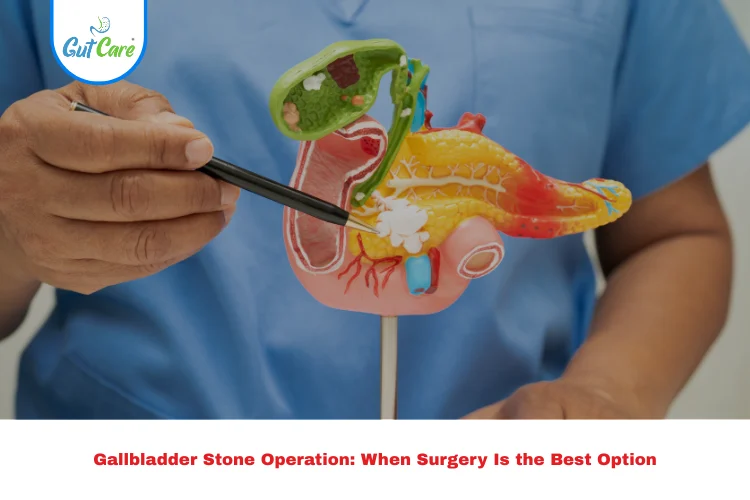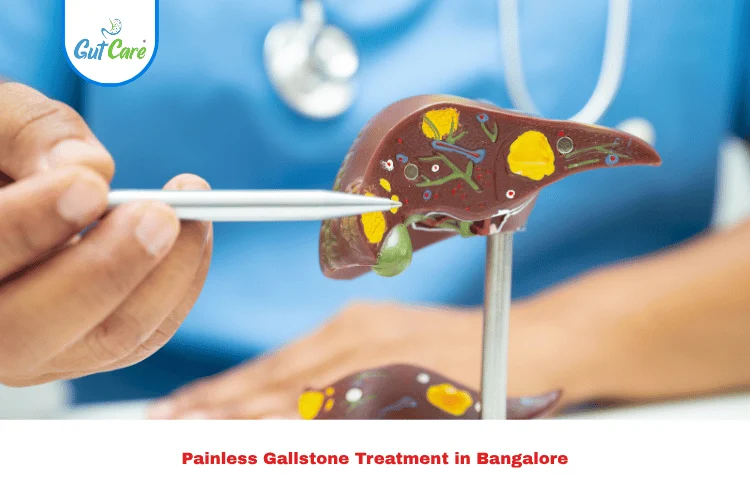Gallbladder problems can be painful and disruptive to daily life. One common issue is gallstones, small hardened deposits that form in the gallbladder. If left untreated, gallstones can lead to severe complications, making timely medical intervention crucial. At Gutcare Clinics in Bangalore, our specialists, including Dr. Yuvrajsingh Gehlot, often recommend a gallbladder stone operation for patients with significant discomfort or risk factors. This article explores when surgery becomes necessary, what the procedure involves, and how to manage recovery effectively.
What Are Gallstones?
Gallstones are solid particles that develop in the gallbladder, a small organ located beneath the liver responsible for storing bile. These stones vary in size and may cause no symptoms, or they can trigger severe pain and digestive issues. Factors contributing to gallstone formation include:
- Excess cholesterol in bile
- Imbalance in bile salts
- Obesity or rapid weight loss
- Family history of gallstones
While some gallstones remain asymptomatic, larger or multiple stones can block bile flow, resulting in pain, nausea, or infection.
Symptoms Indicating a Gallbladder Stone Operation
Knowing the symptoms is key to deciding whether a gallbladder stone operation is necessary. Common signs include:
- Severe upper abdominal pain, often after meals
- Nausea and vomiting
- Indigestion or bloating
- Yellowing of the skin or eyes (jaundice)
- Fever or chills (if infection occurs)
If these symptoms persist, it’s crucial to consult a specialist like Dr. Yuvrajsingh Gehlot. Delaying treatment can increase the risk of complications such as gallbladder inflammation (cholecystitis) or pancreatitis.
When Is Surgery Necessary?
Not all gallstones require surgery. A gallbladder stone operation is typically recommended in the following scenarios:
- Frequent or severe pain (biliary colic): If gallstone attacks disrupt daily activities.
- Complications: Such as cholecystitis, pancreatitis, or blockage of the bile duct.
- Large or multiple stones: Stones larger than 2-3 cm often require removal.
- Risk factors for cancer: Rare, but certain gallbladder conditions can increase cancer risk.
A consultation with a specialist at Gutcare Clinics ensures personalized evaluation and treatment recommendations.
Types of Gallbladder Stone Operations
Modern medicine provides safe and effective surgical options:
1. Laparoscopic Cholecystectomy
This minimally invasive procedure involves small incisions and the use of a laparoscope. Benefits include:
- Faster recovery
- Reduced post-operative pain
- Short hospital stay
2. Open Cholecystectomy
Used in complex cases where laparoscopic surgery is not feasible. It involves a larger incision and longer recovery time but is highly effective.
Your specialist, Dr. Yuvrajsingh Gehlot, will recommend the most suitable approach based on the size, number, and location of gallstones.
Preparing for Gallbladder Surgery
Preparation helps reduce complications and ensures smooth recovery:
- Blood tests and imaging (ultrasound or CT scan)
- Fasting 6-8 hours before surgery
- Avoiding certain medications as advised by your doctor
- Discussing allergies and previous surgical history
Post-Operative Care and Recovery
Recovery varies depending on the surgical method:
- Laparoscopic surgery: Return to normal activities in 1-2 weeks
- Open surgery: Recovery may take 4-6 weeks
- Dietary adjustments: Start with a light diet, gradually incorporating fats
- Regular follow-ups with your specialist at Gutcare Clinics
Maintaining a healthy lifestyle and diet post-surgery reduces the risk of complications or recurrence.
Non-Surgical Remedies (When Surgery Isn’t Immediately Necessary)
For mild cases, non-surgical management can provide relief:
- Dietary changes: Reduce fatty and fried foods
- Hydration: Drink plenty of water
- Medications: To dissolve certain types of gallstones or manage pain
- Regular monitoring: Ultrasound check-ups for stone progression
However, these remedies are temporary measures. A gallbladder stone operation is often the definitive solution for long-term relief.
Summary
Gallstones can range from mild discomfort to severe, life-threatening conditions. While non-surgical remedies can manage minor symptoms, a gallbladder stone operation is necessary when pain, infection, or complications arise. Consulting a qualified specialist, such as Dr. Yuvrajsingh Gehlot at Gutcare Clinics, ensures personalized care and optimal outcomes. Don’t ignore persistent abdominal pain—seek expert advice to prevent serious complications.
FAQs
1. What is a gallbladder stone operation?
A gallbladder stone operation, or cholecystectomy, is the surgical removal of the gallbladder to treat gallstones that cause pain, infection, or digestive issues.
2. How do I know if I need a gallbladder stone operation?
Consult a specialist if you experience severe abdominal pain, nausea, jaundice, or frequent gallstone attacks. They will recommend surgery if non-surgical remedies are ineffective.
3. Can gallstones be treated without surgery?
Mild cases may be managed with dietary changes, hydration, and medications. However, surgery is often the most effective long-term solution.
4. Who is the best specialist for gallbladder stone operation in Bangalore?
Dr. Yuvrajsingh Gehlot at Gutcare Clinics is a trusted specialist for gallbladder stone operations in Bangalore.
5. How long is recovery after a gallbladder stone operation?
Recovery depends on the procedure type. Laparoscopic surgery usually allows a 1-2 week recovery, while open surgery may take 4-6 weeks.




